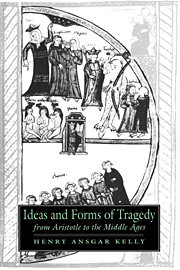Preface
Published online by Cambridge University Press: 22 September 2009
Summary
In this book I have set myself the task of examining the various ideas that were associated with the Greek word τραγῳσíα and the Latin tragoedia (or tragedia in its later medieval spelling) and its vernacular “reflexes” in Antiquity and the Middle Ages up to the time of the Italian prehumanists. My primary emphasis is upon medieval understandings and practices, and my treatment of the classical period in chapters 1 and 2 is designed principally as background for the later material. In these early chapters, after a brief look at Aristotle's Poetics, I examine the theories and applications of tragedy in classical Rome. In chapter 3, I analyze the conjectures made by Isidore of Seville and others in the early Middle Ages about the nature of ancient Roman tragedy, and in the next chapter I deal with the more enlightened views of twelfth-century writers. The fifth chapter takes up the thirteenth and fourteenth centuries. First, I study early reactions to Aristotle's Poetics and to Seneca's newly discovered tragedies. Next, I examine Dante's subject/style notion of tragedy (noblest subjects, highest style), and the narrative idea of tragedy (beginning in tranquillity and ending in horror) set forth by his mystified commentators. Then I survey the various meanings of tragedy in French translations of Boethius and other Latin works.
Information
- Type
- Chapter
- Information
- Ideas and Forms of Tragedy from Aristotle to the Middle Ages , pp. xiii - xviPublisher: Cambridge University PressPrint publication year: 1993
